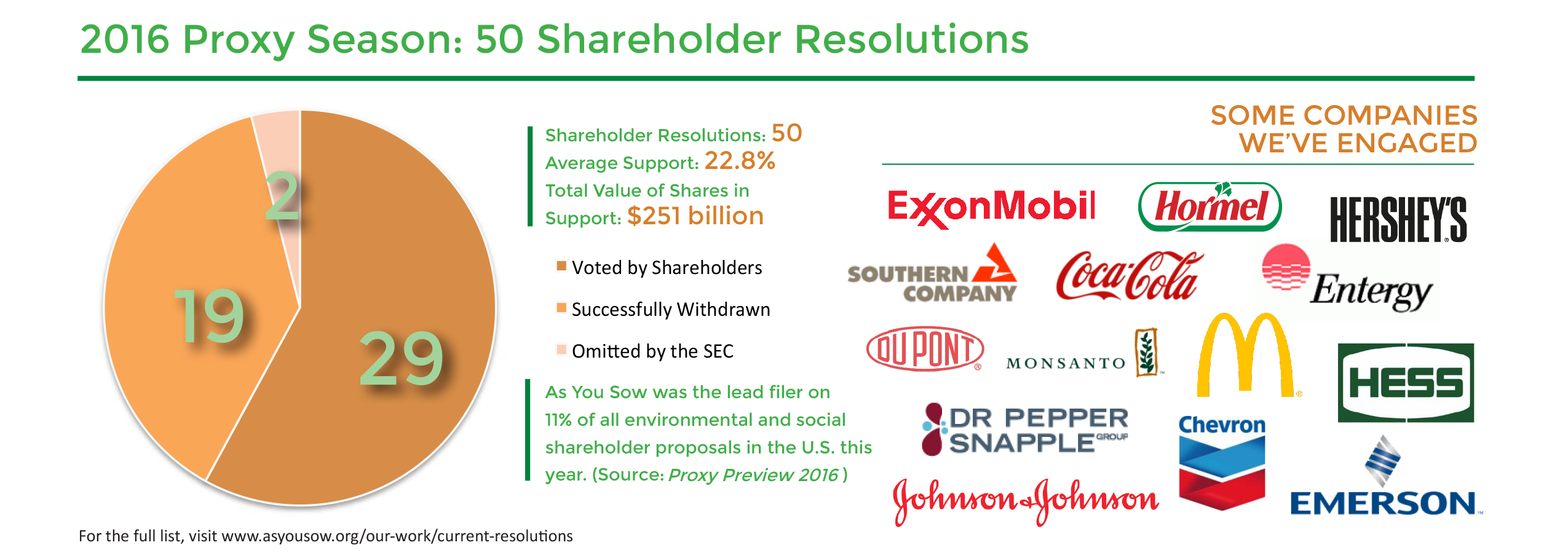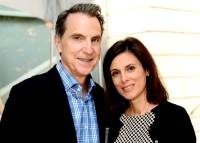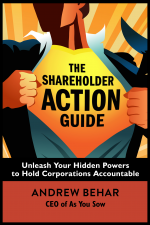
Welcome from our CEO
The first half of 2016 has seen our team focused on a range of critical environmental, social, and governance issues that, taken together, continue to put profound pressure on corporate leaders toward greater transparency, equity, and environmental justice. Each engagement, dialogue, shareholder resolution, proxy vote, and research report is a step on a long path aligning corporate value with the greater needs of people and the planet.
So far this year, we have engaged over 50 corporations and worked diligently to hold them accountable for their policies and practices on climate change, environmental health, waste, and misaligned executive compensation packages. We have researched, written, and released three reports and added two new talented staff members to our team. All of this activity is linked in a broad vision of comprehensive systemic change where shareholder investments are aligned with values.
Enjoy the Summer 2016 edition of Seeds of Change and join us in building a just and sustainable future.
Best,


Andrew Behar, CEO
Super-shareholders Take on Superbugs
By Austin Wilson, Manager, Environmental Health Program
The news about antibiotic resistance has been grim. This June, bacteria resistant to the antibiotic of last resort were found in the U.S., and a prominent economist suggests that the threat is “as significant as climate change.”
One of the causes of antibiotic-resistant bacteria (a.k.a, “superbugs”) is the overuse and misuse of antibiotics in the meat industry. The majority of antibiotics in the U.S. are given to healthy chickens, pigs, and cattle to make them grow bigger, prevent, or treat illness in cramped and unhealthy environments. Other countries, such as Denmark, raise affordable meat without relying on antibiotics—they rely on good animal husbandry, including clean facilities, and quality feed.
In the first year of our new Antibiotics and Factory Farms initiative, we successfully withdrew shareholder resolutions with Hormel Foods (a leading turkey and pork producer), Wendy’s, and the parent company of Burger King. All three companies agreed to create stronger policies before the end of 2016, and two added As You Sow to their expert advisory groups. Our resolution with McDonald’s, the first resolution on antibiotics to be voted in several years, was supported by 26.3% of shares!
We are continuing to mobilize shareholders, engage new companies, and keep the pressure up on the food industry. To stop superbugs, we have to act fast.
Lead in our Chocolate: Cleaning up the Food System

As You Sow’s Lead in Food initiative continues to focus on lead and cadmium in chocolate products.
By Danielle Fugere, President and Chief Counsel
As our nation grapples with entire towns exposed to lead in their drinking water, and experts agree that there is no safe amount for children, As You Sow’s Lead in Food initiative continues to focus on lead and cadmium in chocolate products. We are actively working with chocolate manufacturers to either remove or reduce the levels of these heavy metals in their products, or provide consumers with warnings. Lead consumption can cause neurological impairment, among other harms, and can impair learning and cause irrational behavior in children. Cadmium can cause damage to the kidney, liver, and bones. In time for Easter, As You Sow published new testing results, showing that 35 of 50 chocolate products tested contained lead and/or cadmium above the levels set by California’s Safe Drinking Water and Toxic Enforcement Act. We have filed legal notices with 23 manufacturers and/or retailers, including Trader Joe’s, Hershey’s, and Ghirardelli, for failing to warn consumers.
Our goal is to work with chocolate companies to identify sources of heavy metals in their products and to reduce the levels below the legal limit. In our investigation, we have learned that in some countries drying chocolate by the side of a busy roadway can cause heavy metal contamination from airborne diesel fuel exhaust; other sources may include application of pesticides and contaminated processing machinery, containers, and even packaging. If the lead can’t be readily removed, we are asking that manufacturers provide the required warning so that consumers can make their own decisions about how much chocolate to consume. So far, the industry has been reluctant to take action. In fact, Trader Joe’s, the first company with which we filed a legal complaint, appears willing to litigate rather than provide warnings. We continue settlement discussions and it is our hope that we can work with these chocolate companies to address this ongoing and important problem.
Chipotle and YUM! Deliver Leading Recycling Commitments

A lot more fast food packaging will be taking a circular trip for recycling, rather than a one-way trip to the landfill.
By Conrad MacKerron, Senior Vice President
A lot more fast food packaging will be taking a circular trip for recycling, rather than a one-way trip to the landfill, thanks to our Waste program efforts. Fast food giants Chipotle and YUM! Brands (KFC, Taco Bell, Pizza Hut) set substantial food waste and packaging recycling commitments this spring following engagement and the filing of shareholder resolutions. Equally important, Dunkin’ Donuts has agreed to conduct a recycling feasibility study for its new polypropylene coffee cups, with results to be released later this year.
Chipotle has demonstrated leadership this year in committing to a 50% food and packaging waste diversion goal by 2020, similar to one announced by McDonald’s in 2014. Chipotle will divert packaging away from landfills by composting and recycling. The company estimates that about 875 of its locations (nearly half) already offer front-of-house recycling options to customers for at least one packaging item such as paper, plastic, glass, and metal, and 138 locations are composting organics. The company also says 80% of its restaurants are recycling back-of-house cardboard packaging. Based on this information, we believe Chipotle could become the industry leader on packaging recycling and composting.
YUM! announced a similar diversion goal by 2020 focusing initially on food waste reduction, as well as recycling of back-of-counter oil and corrugate.
Is Your 401(k) Full of Climate Risk?
By Andrew Montes, Director, Digital Strategies
Since we launched Fossil Free Funds – our online app allowing you to measure the climate risk of your mutual fund investments – we’ve seen a tremendous response from people who want to make sure their money isn’t invested in fossil fuels. Some care about carbon pollution, some about financial risk, and many care about both. But whatever the reason, a growing number of people care and can now take action. People are excited that they can make small changes to their 401(k) or personal investments and make a big impact toward building the clean energy future. This growing demand for funds that are fossil free has incentivized many fund managers to drop the fossil fuel holdings from their mutual funds, increasing the number of diversified SRI funds by 50% since the new year and increasing assets under management in these funds by $700 million. Based on this success, we’re expanding our horizons—the Fossil Free Funds database now has over 6,500 funds from six countries, including the United Kingdom, France, Germany, and Denmark. Our U.S. coverage has grown to 3,000 funds, and more funds under our searchlight means more fossil fuel investments made transparent. We’re also planning to add new features to the tool, like carbon footprinting and how funds vote their proxies on climate issues.
Lastly, we’ve taken on the problem of people’s savings being invested through their employer’s 401(k) plan with no fossil free option available. Our 401(k) Toolkit is a handy resource for people looking to add options to their company’s retirement plan. Employees can learn how to organize and effectively articulate their concerns to their plan administrator. More than 20,000 people have signed a petition asking their companies to offer fossil free options and we’ve written letters to 100 major U.S. companies asking them to offer at least one socially responsible, fossil free option in their 401(k) plans. We’ll let you know what they have to say.
We will keep working hard to shine the light on risky fossil fuel investments – sign up at FossilFreeFunds.org to stay tuned!

2016 Proxy Season Year-to-Date

Click on image view larger version
Shareholder Advocate and Donor Profile: George and Amanda Hanley, The Hanley Foundation

George and Amanda Hanley
“Both personally and through our foundation work, we’ve been committed to doing our part in contributing to a better, more sustainable world for decades. Whether by promoting a stable climate, the transition to a clean energy future, local sustainably grown food, and environmental education, we are passionately determined to create a more just and sustainable future for all. In recent years, we’ve expanded our climate activism by investing with our mission in mind and joining the Divest-Invest movement. We are excited to support As You Sow. Their unique leadership in educating and empowering people to align their investments with their values, along with their instrumental role as shareholder advocates to spur corporate social responsibility, is advancing real change.”
Incentivizing Big Oil to Transition to a Clean Energy Future

It has been a busy year working to move the energy industry towards sustainability, but 2016 marks our most successful year yet.
by Amelia Timbers, Manager, Energy Program
This year, the Energy Program filed 27 shareholder resolutions and negotiated agreements with nine companies to move the extraction and utility industries to more quickly transition toward a clean energy economy. In addition to our important work on carbon asset risk and hydraulic fracturing, we led the investment community with an innovative clean energy resolution at ExxonMobil and Chevron. Called “Carbon Asset Transition” or CAT, the resolution recommends a simple change: that companies report to shareholders all energy resources – including geothermal, biofuels, wind, and solar – by category, in a single energy unit called BTUs. This reporting change allows the market to fully value clean energy, not just barrels of oil, aligning market incentives with the imperative for clean energy. The goal is to provide a path for Big Oil to become truly diversified and to transition to competitive energy companies that can thrive in a carbon-constrained future.
We also led first-ever filings in the utility sector with carbon asset risk resolutions at Great Plains Energy, American Electric Power, FirstEnergy, and Southern Company, addressing the growing risk that the companies’ coal assets could become stranded. The Great Plains and American Electric Power resolutions were withdrawn in exchange for landmark agreements, and the FirstEnergy and Southern Company resolutions received 31% and 29% shareholder support, respectively—a clear call for these companies to move away from coal.
In response to the withdrawal, American Electric Power published a strong carbon asset risk report, available on its website now, making major commitments to ramp up renewable energy adoption. As You Sow also filed, in partnership with other investors, a resolution pushing Duke Energy to modernize its business. Shortly after Duke and investors reached an agreement in exchange for withdrawal, it announced significant increases in its renewable energy adoption. As You Sow has been working with Duke Energy since 2010, encouraging the company to move away from coal and toward clean energy sources.
We also continued to pressure fracking companies, including ExxonMobil and Chevron, to improve their best management practices and transparency, extending this work to mining and gas giant Freeport McMoRan, which must provide far better reporting to shareholders on how it is reducing and preventing impacts of its urban fracking operations on Los Angeles communities. It has been a busy year working to move the energy industry towards sustainability, but 2016 marks our most successful year yet.
Slavery-free Supply Chains
 By Patricia Jurewicz, Director, Responsible Sourcing Network
By Patricia Jurewicz, Director, Responsible Sourcing Network
We’re happy to report that for the 2015 cotton harvest, the youngest children ages 7-15 in Uzbekistan were again kept out of the fields! Unfortunately, over a million teachers, nurses, and administrators were forced to pick cotton and this spring they are now having to weed the fields. Responsible Sourcing Network (RSN) is continuing to build the business plan and coalition to launch YESS: Yarn Ethically and Sustainably Sourced. This initiative will create a training and verification system for yarn spinners so brands are certain they have no slave-produced cotton from Uzbekistan in their supply chains.
We are also looking at the broader global problem of modern day slavery and human trafficking and have been commissioned to write a report looking at how markets and corporate power can be brought to halt this heinous practice. With over 21 million people on the planet working under forced labor conditions – twice as many people as were sold into slavery in the Americas during the 1800’s – now is the time to focus major attention on this issue and target coordinated action from companies, investors, and the general public.
And we are still hard at work on conflict minerals from the Congo. For the third year in a row, companies submitted their conflict minerals reports to the Securities and Exchange Commission at the end of May. To highlight the activities companies have taken (or need to take) to have a positive impact in Congolese mining communities, we are analyzing the reports and will release our 2016 Mining the Disclosures report in the fall. See our new infographic on our website: sourcingnetwork.org.
CEO Pay: Those Who Rubber Stamp Pay are on Notice

By Rosanna Landis Weaver, Manager, Power of the Proxy: Executive Compensation Program
As You Sow’s exposure of overpaid CEOs and the funds that support them gained traction with the publication of our second report, The 100 Most Overpaid CEOs: Are Fund Managers Asleep at the Wheel?.
Shareholder proposals based on poor voting records that were disclosed in the report were filed at State Street by As You Sow and at BlackRock by Stephen Silberstein. These two major fund families voted 97% and 99% in favor of all pay packages, no matter how egregious. A New York Times article by Gretchen Morgenson was aptly headlined, “BlackRock Wields Its Big Stick Like a Wet Noodle on CEO Pay.”
As You Sow’s research was also used by a coalition of SRI funds to file proposals calling for reports on linking pay and sustainability. Many CEO pay plans are structured to focus on the short term in ways that are harmful to the larger goal of a sustainable company. For example, if a change toward environmentally responsible packaging will be initially costly though ultimately cost-saving, the temptation to focus on the short term works to the detriment of long term shareholder value.
A working group from several SRI funds joined together to call on companies to evaluate how and whether to add sustainability metrics to their compensation plans. The working group looked at As You Sow’s compensation analysis and sustainability practices and chose a small number of companies to target with shareholder resolutions. In addition to As You Sow, groups filing and co-filing the proposals included Trillium Asset Management, Walden Asset Management, Friends Fiduciary, Clean Yield, and Mercy Investment Services.
COMING SOON:

Berrett-Koehler Publishers, Nov 2016.
Glyphosate Report
This summer, As You Sow will publish a report on the world’s most controversial herbicide. Our report will tell the story of glyphosate (sold by Monsanto under the brand name Roundup) and expose the failures of government regulators to act in the public’s best interest. We will break down all of the news, research, and misinformation; and share our recommendations about the most-used herbicide in history.
Shareholder Action Guide
The Shareholder Action Guide distills As You Sow’s 25 years of experience into actionable knowledge for everyone who wants to make a difference.
“A valuable call to action for small shareholders to change the ways big corporations do business.”
-Robert Reich, Former U.S. Secretary of Labor
Welcome, Taraneh and Cody!

Cody Mitcheltree and Taraneh Arhamsadr
In April, As You Sow welcomed two new full-time staff members to the team. Taraneh Arhamsadr came on as Communications Director with over a decade of diverse experience in communications and outreach, focused primarily on environmental and social issues and public works projects. Before her most recent experience as a consultant in communications and digital strategy for organizations like Children & Nature Network and Center for a New American Dream, Taraneh served as the head of Communications for Berkeley’s David Brower Center, a community space serving as the Bay Area’s hub for the environmental and social justice movement. She is eager to develop a deep understanding of As You Sow’s diverse program areas and help design and implement a long-range communications vision and strategy for the organization.
Cody Mitcheltree joined the ranks as Development and Operations Associate, where he works to support the development and operations teams to further the foundation’s efforts. He comes from the nonprofit world where he has worked in social media marketing, membership administration and retention, leadership development, IT, and Salesforce administration. He earned his Bachelor’s in Political Science with a Minor in International Relations at San Francisco State University and went on to become a certified paralegal and obtain a Master’s in Public Administration degree, where he focused on public policy with an emphasis on environmental policy and sustainability. “I’m excited to bring my diverse set of skills and knowledge to the organization and contribute in As You Sow’s mission to bolster environmental and social corporate responsibility,” Mitcheltree said.
2015 Annual Report
Click to download the Annual Report


















 By Patricia Jurewicz, Director, Responsible Sourcing Network
By Patricia Jurewicz, Director, Responsible Sourcing Network



